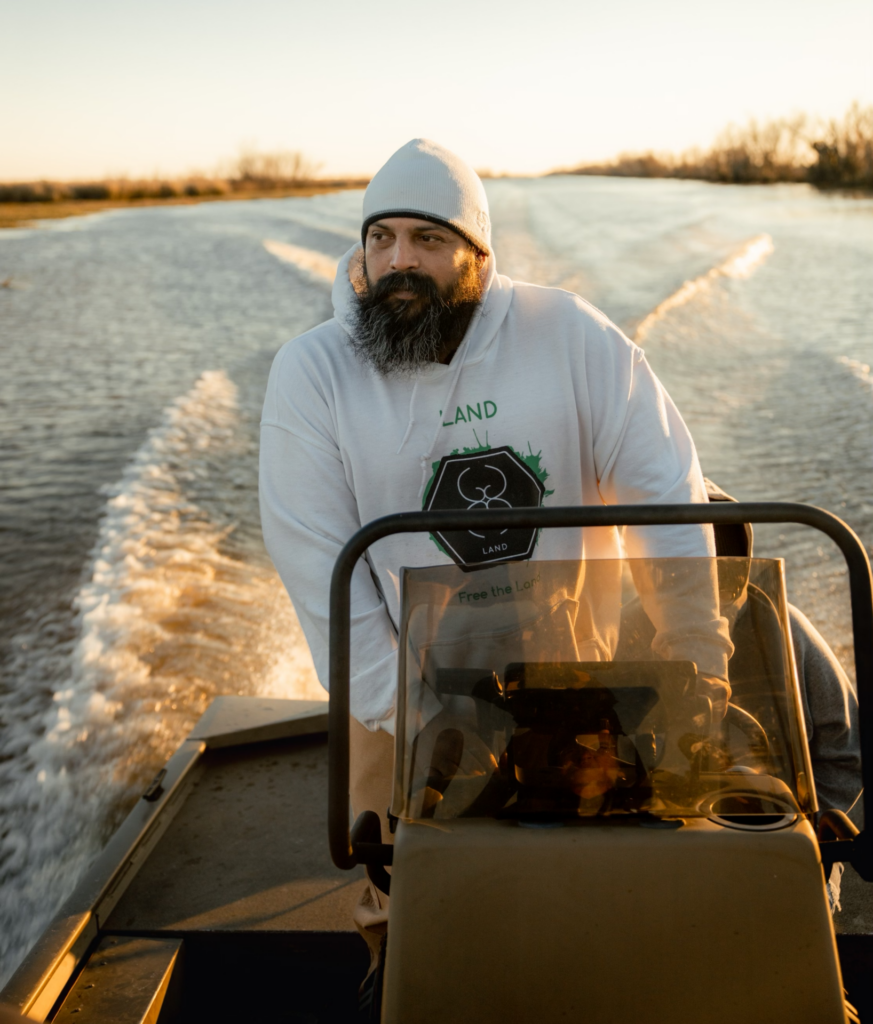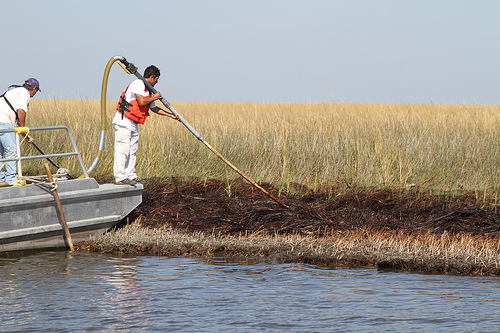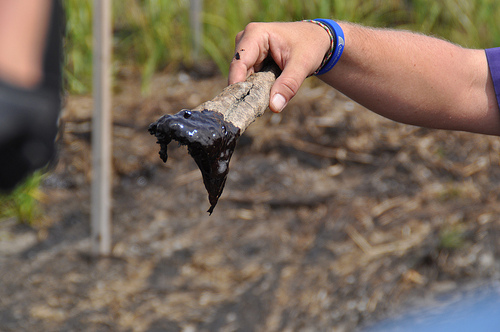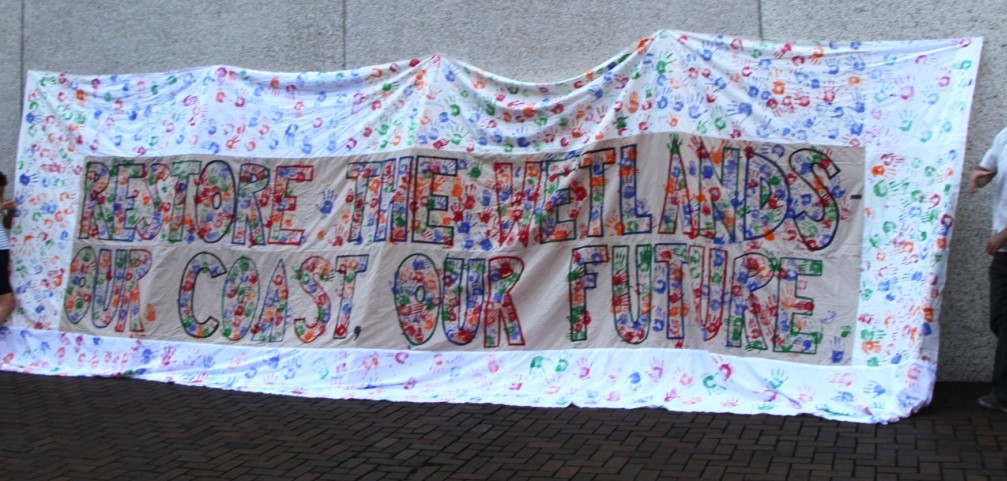Justin is a tribal member of the United Houma Nation, organizing fellow with Healthy Gulf, commercial fisherman, and 10 year veteran of the Gulf oil fields.
Halito, bon joure, bienvenue, I’m Justin Solet, a member of the United Houma Nation. I was born in the town of Dulac, Louisiana where I grew up in a family of fishermen and fisherwomen. My mother worked in the shrimp processing factory while my father ran my grandfather’s shrimp boat. My father also shucked oysters alongside my grandmother between shrimp seasons. Commercial fishing earned my parents a modest living which they used to raise three boys. As the eldest of the three children, when I was old enough to get on the boat—around 7 or 8—I worked with my dad as a deckhand until I eventually went to work in the Gulf of Mexico as a snubbing hand on oil rigs. On my days off from the rig, I still helped my dad on the boat. Shrimping was not just a job, it was a way of life, not only for my family but our culture and our community.

In August of 2009, the year before the oil spill, many shrimpers from multiple parishes along the Gulf Coast were already on strike during the fall shrimp season, protesting the low prices offered at the docks throughout South Louisiana. Over 80% of the seafood consumed in the United States is imported, so many fishermen had either tied up their boats in protest or never took them out to begin with. The fall shrimp season is called the money season, as it’s the season that can carry families through the winter until the 55-day spring season starts in late April or early May.
Fast forward to April 19, just 21 days before inshore shrimp season, there was already talk around the bayou that this would be a great May season. Prices at the factories were going to be up, the catch was going to be bountiful. It was just another day in the life of a shrimper… we rose the next morning not knowing what the future had in store for our families and community.
April 20, an explosion aboard the Deepwater Horizon rig in the Gulf of Mexico held everyone in disbelief as we found out it took the lives of 11 men. In the coming days and weeks we would learn 5 million barrels of oil spilled into the Gulf. It took 9,700 vessels, 127 aircraft, 47,829 people, nearly 2 million gallons of toxic dispersants called COREXIT, and 89 days to stop the spill. 3,000 miles of beaches and wetlands along the Gulf Coast were contaminated by oil. Even the clean up effort was damaging to the wetlands and vegetation. Our lives were turned upside down with fear, questions, and a future full of unknowns.

In the coming weeks we heard that BP was hiring fishermen to clean up the spilled oil. I asked my dad if I could run the boat to join the cleanup operations. It was a hard no. In his words, “you and I both worked in the oil field, you know the empty promises they give us. They caused this mess, but they want to use us as cheap labor knowing we don’t have a choice. BP will not destroy everything I have and they won’t destroy my boat.” Not long after that conversation with my dad, Mr. Ken Feinburg (the appointed claims czar from DC) came down and started offering us $5,000 checks.
Blood money checks we called them. The May shrimp season was supposed to open on the 10th and we had been on strike since August of the previous year. What were we supposed to do? Families were hurting and broke and didn’t know where to turn. No one was buying seafood from the Gulf for fear that it was tainted with oil. We took those checks in the hopes that BP was going to eventually do right by their promises. It was then I knew my dad’s predictions about false promises were all starting to fall into place in the exact way he described.
Vessels of Opportunity, sounds hopeful and has a nice ring to it, but for fishermen that ran those boats and the deckhands that they employed, It was a waking nightmare. These men and women, many of them my family, breathed burning crude oil fumes and were soaked in crude daily while using their boats to “fish” for oil using floating oil booms.
The health effects of working in these conditions still aren’t completely understood. Many of my cousins who worked cleaning up BP’s mess became sick with lung problems, heart problems, and even cancer. To this day, I hold the BP oil spill to blame for some deaths in the family. They suffered to support their family in a situation that was beyond their control.

Then came the community meetings. More false promises to fishermen and their families. These promises came in the form of one time payouts of $25,000 to be paid after you signed away your rights to sue BP in a class action lawsuit. Holding out until a settlement was reached could take months or even years. It was at one of these meetings at the Dulac gym where I first met the engineers for BP and the EPA. They discussed capping the well to a group made up of 120 elders, fishermen, dock owners, and children, some of whom were crying. None of these community members knew anything about the intricate operations of subsea BOP’s and subsea well control. I spoke up telling the “engineers” that what they were about to try was not going to work.
They scoffed and asked how I knew it wouldn’t work. I explained my background in snubbing as a blowout specialist. They said they knew what they were doing and that they were giving hope to a community that desperately needed it. More false hope and false promises. Needless to say, capping the well failed on the first try, ultimately taking 89 days to stop the spill.
As I reflect on my memories of the BP oil disaster that came so close to destroying my way of life and community, I’m happy to say it was the beginning of my activism. Since that day in 2010, I have been working to save the land and waters that I call home. It was in this fight that I met my fiancé, Bette Billiot, and last year, I went to Glasgow, Scotland for the COP26 Climate Change Conference where I met new people, shared my story, and learned how the Gulf South shares its fight with the Global South. I need these companies to know the Gulf is not a sacrifice zone.
“Justice will not be served until those who are unaffected are as outraged as those who are.”- Benjamin Franklin

…
Justin is a tribal member of the United Houma Nation, organizing fellow with Healthy Gulf, commercial fisherman, and 10 year veteran of the Gulf oil fields. As an Indigenous person living on the Frontlines, he sees first-hand how the promises oil and gas companies are just empty words used to target, divide, and conquer peoples living in black, brown, indigenous, and impoverished communities. Fighting for all Peoples’ rights to live with healthy air, water and a piece of land they can call their home is his biggest priority. His call to action came on April 20, 2010, the day his fishing community was nearly destroyed by the BP disaster. Whether it’s stopping carbon capture and storage (CCS) with Louisiana Against False Solutions, or cooking for friends on a weekend, organizing and educating for a true and just transition is the passion that keeps hope alive for him and his family.
